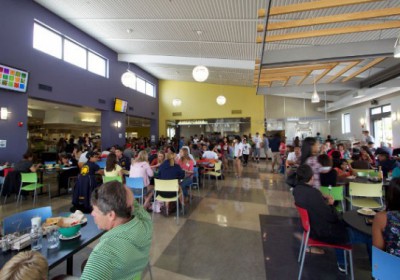By Nathalie Vera
Writer
For many University of California Santa Barbara students, the dining commons serve up more than a plethora of foods. It is an employment haven for those seeking jobs, a place to hang out with friends (until closing time) and a place where willpower to eat healthy is tested.
“The meals served everyday in our four dining commons are nutritionally balanced to meet a myriad of dietary needs. Health is a concern and therefore we have made strides to provide quality food,” said Danielle Kemp, a dietitian for UCSB. “For example, all of the cooking oil used is trans fat free, and [we] provide fresh fruits, vegetables and a variety of grains, nuts, legumes and juice with no sugar added.”
In addition, there are meals specifically prepared to fulfill vegan and vegetarian dietary needs, which also serve as a healthier option for students who are more conscious of their eating habits. Kemp also highlights the beneficial value of the online dietary program, NetNutrition, which allow students to review the weekly menus and their nutritional information so that they make smarter food choices.
“I feel that there is a wide range of things for me to eat,” said first-year psychology major Mariana Cruz-Garcia. “I am actually very happy that there are so many delicious options here. It makes being a vegetarian a lot easier!”
Cruz-Garcia, who is partial to Ortega and De La Guerra, feels like she’s never been healthier, and comments on how flavorful and well-prepared the food is.
“No dish is ever bland,” she says.
Like Cruz-Garcia, many other vegan or vegetarian students are satisfied with the ability of the dining commons to cater to their dietary needs.
Ariana Zepeda, a fourth-year sociology and Chicano studies double major who has worked at Carrillo as a student cook for all of her four years at UCSB, can vouch for how the food is prepared. She stated that on a daily basis the fruits and vegetables are always fresh.
“[They] are ordered on a weekly basis, and the older fruits and vegetables are disposed in the recycling bins,” she said.
Zepeda said that she would also consider the overall food composition to be very healthy, with the exception of Fridays, when higher calorie foods are served.
Other students, however, are not as quick to give praise.
“I feel that a lot of the food offered is unhealthy,” said Donna Rosenberg, a first-year history major, referring to the amalgamation of cookies, cakes, greased food, and more that the commons offer.
Rosenberg also says that while there are a good variety of food options, the menu can be very repetitive. She does note, however, that there are substitutes.
“For every unhealthy option, there’s an alternative healthier option. For lunch there will be shoestring fries, but also a salad bar. [There] can be a balance between healthy and unhealthy options,” said Rosenberg.
Although UCSB’s dining commons certainly have a lot to offer, especially in comparison to other schools, there have been suspected cases of food poisoning cases in the past, such as in 2010 when a number of patrons at Portola claimed the seafood made them sick. An employee at Ortega who preferred to be anonymous for fear of losing their job, also shared that there was a rodent problem there a couple of weeks ago; however, it was attended to immediately and eliminated within a few days.
Incidents like these are potentially threatening to the health and wellness of many students, especially considering how many people frequent the commons every day and touch the same utensils, tables, etc. To prevent food from spoiling and the spread of germs and cross-contamination, the dining commons employees take a number of precautionary measures.
It is a common sight, for example, to see a dining commons worker testing the temperatures of the foods to make sure that they are within the acceptable range that food handling protocol stipulates. However, according to an employee at Portola, who also wanted to remain anonymous to protect their employment status, there have been occasions in which some of the workers didn’t follow all of the outlined sanitary procedures, avoiding important steps like constantly washing their hands or wearing the required gloves for food handling.
Nonetheless, students should be aware that the food placed before them goes through a lot of thought and preparation, and the convenience of having pre-made food is one that often goes unacknowledged.












Comments are closed.